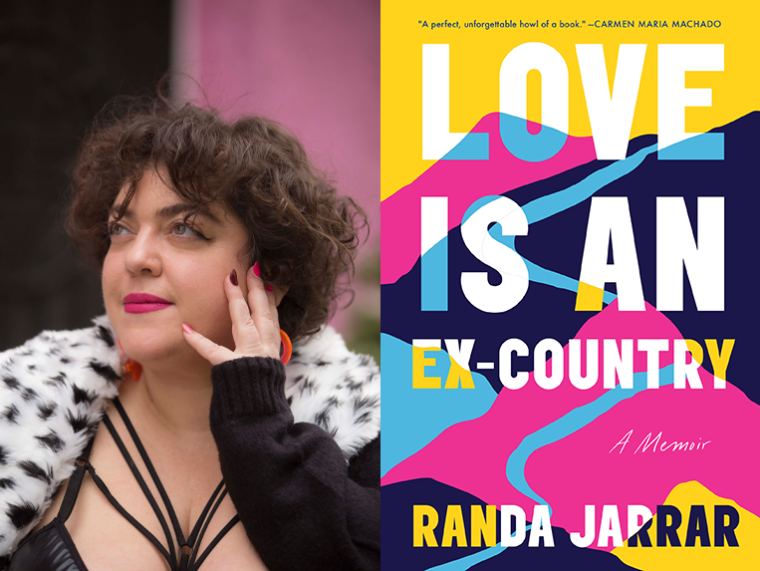This week’s installment of Ten Questions features Randa Jarrar, whose memoir, Love Is an Ex-Country, is out today from Catapult. Love Is an Ex-Country opens in the summer of 2016, in the shadow of the upcoming presidential election, as Jarrar sets out on a cross-country road trip from California to Connecticut. Along the way there are many moments of joy and pleasure: She gathers with fellow Arab American and Muslim writers at a conference in Minneapolis, for instance, and reflects, “I wish we could spend our whole lives in celebration, communion, checking on each other, loving each other, being free.” Yet the journey also presents new challenges, and throughout the book, Jarrar revisits painful memories of domestic abuse, racism, and death threats. But no matter her subject, Jarrar steers through the varied landscape of America and memory with steady hands, speaking boldly and truthfully at every turn. “There wasn’t a page in this memoir that didn’t make me want to jump up and cheer, murmur in awe, scream with laughter, or weep,” writes Melissa Febos. Randa Jarrar is also the author of the novel A Map of Home (Penguin Books, 2009) and the short story collection Him, Me, Muhammad Ali (Sarabande Books, 2016). Her writing has appeared in the New York Times Magazine, Salon, Bitch, and Buzzfeed, among other publications. She lives in Los Angeles.

Randa Jarrar, author of Love Is an Ex-Country.
1. How long did it take you to write Love Is an Ex-Country?
Some of the chapters were written seven years before the book sold. But from the moment I understood this would be a book to the moment I sent it out: three years.
2. What was the most challenging thing about writing the book?
I love being in a car and hearing directions to “go straight.” I always yell, “Gayly forward!” I wanted to write a road trip memoir but to subvert the form, so that readers would share my sense of disorientation as a refugee, as well as my sense of alienation. But I also wanted the book to be read. Ha! So the toughest part was finding a balance between reflecting my experiences of trauma and exile, while guiding the reader gayly forward through the narrative.
3. Where, when, and how often do you write?
Any time, any place, and as often as I feel like it! I self-assign deadlines for my creative projects. I raised a child alone, so I always had to write wherever I could: McDonald’s play areas, the park, at cafés with cheap tacos, and so on. Nowadays I tend to write where I’m most comfortable. I write quick drafts and spend most of my time revising.
4. What are you reading right now?
Craft in the Real World by Matthew Salesses, which is long overdue and needs to be required reading for both students and professors.
5. Which author, in your opinion, deserves wider recognition?
Sherley Anne Williams, specifically her book The Peacock Poems, a beautiful book about Black desire, motherhood, and California’s Central Valley.
6. What is the biggest impediment to your writing life?
Racism and imperialism—the biggest impediments to the vast majority of people’s lives, really.
7. What is one thing that your agent or editor told you during the process of publishing this book that stuck with you?
It’s not really one thing editor Megha Majumdar told me, it was what and how she told me in her first round of editorial notes. When I received her comments I was at AWP in Portland—a Very White conference in a Very White city. I’d never had a book editor of color. I was so moved by how deeply engaged she was with my work, her sharp and great suggestions, the way she saw my story, that I wept.
8. Would you recommend writers pursue an MFA?
Only if they’re paid to, or it’s an affordable state school. Academia is often harmful for the most marginalized of us.
9. Who is your most trusted reader of your work and why?
Women and nonbinary queers of color, because we are who I write for. My first reader tends to be a close friend, and for Love Is an Ex-Country, it was writer Christine Hyung-Oak Lee, with whom I share a lot of intersections. She was equal parts encouraging and constructive in her criticism.
10. What’s the best piece of writing advice you’ve ever heard?
When you’re working on a project, create a regular writing schedule and commit to completing a scene each time you write. For some, word counts and page numbers work best. But once a teacher told me to shift to scenes, books happened.







